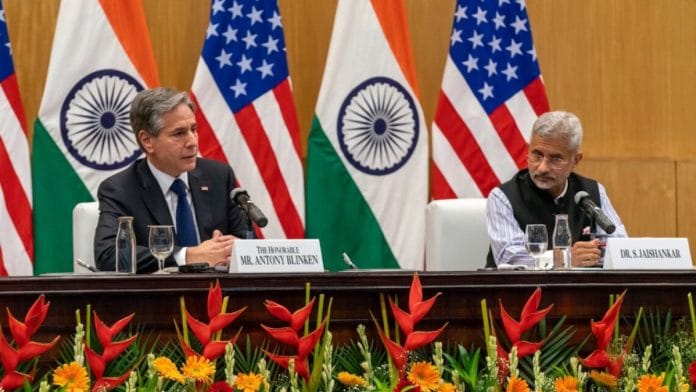Days after Prime Minister Narendra Modi was seen and heard publicly chastising Russian President Vladimir Putin for choosing war over peace in Ukraine on the margins of the Shanghai Cooperation Organisation summit in Samarkand last week, External Affairs Minister S. Jaishankar is travelling to the US where he is scheduled to meet his American counterpart Antony Blinken and US Secretary of Defense Lloyd Austin. He will also participate in meetings of the Quad, BRICS and the UN.
The visit comes at an important time in the India-US relationship, which has been recently characterised by greater anxiety than comfort—which is odd, considering that the world’s oldest and largest democracies have publicly demonstrated both affection and confidence in each other at least since the 2008 Indo-US nuclear deal.
A frosty relationship
But some things seem to have fallen apart recently under US President Joe Biden’s watch. No big ideas seem to be consuming both nations. A free trade agreement, on the anvil at least for the last five years, seems to have been put into cold storage for now. The lack of a US ambassador at Roosevelt House in Delhi since the previous incumbent Kenneth Juster left a couple of years ago, certainly hasn’t helped matters.
In its stead, a growing suspicion rules. The Modi government is increasingly of the view that the Biden administration is being distracted from its main job, which is to expand and deepen the US’ relationship with India, by the exclusive pursuit of religious freedoms and human rights by do-gooders in Washington DC.
Nevertheless, the Biden administration will not formally criticise India but leave it to its evangelical officials to censure New Delhi for curbing freedoms, fundamental rights and labour laws and short-changing India’s unique destiny as a democracy.
The difference between the Barack Obama and Joe Biden administrations is that Obama at least recognised that the fundamentally vibrant nature of India’s democracy could not be put down. Biden, on the other hand, seems unable to understand the difference.
Moreover, Biden’s officials have been consumed with India’s reliance on Russian energy in recent months and are increasingly of the view that New Delhi must choose between supporting US sanctions on Russia. Equally stubbornly, Indian officials point out that cheap, discounted Russian oil since the war with Ukraine six months ago has amounted to a significant saving for the Indian exchequer, as much as Rs 35,000 crore.
It is this discrepancy in worldview that is hurting this relationship at the present moment. And that is why Jaishankar has gone to the US, in the hope that his honest conversations with Blinken, Austin and some Congressmen and women will heal the divide.
Also read:
Bridging the divide
There are several themes that Jaishankar can spin. First, Russia. The fact that PM Modi spoke clearly with Putin and told him that it was unfortunate he was choosing war over peace with Ukraine, or the fact that his comments in Hindi were put out on all social media, is a signal that India is not completely on Putin’s side of the fence.
Certainly, this is a message to the US. That it should not believe that just because India is buying large amounts of discounted oil from Russia—naturally, in order to shore up its economy—it supports Putin’s war. It does not and Modi has made that amply clear.
Moreover, the fact that the famed Russian army has still not been able to subdue Ukraine even after six long months and has even lost a Russian-majority town like Kharkiv demonstrates to India that it must reduce its dependency on Russian defence equipment.
Fact is, India is dreadfully concerned that the war will go on and on—as Putin has promised—and that the West will be forced to defend Ukraine, no matter the cost. It is clear that India has no option but to keep buying the discounted oil from Russia—even while it holds its nose on the rest of Russia’s policies.
Second, China. Jaishankar will hope the US understands the determination with which India has withstood Chinese pressure these last couple of years with PLA troops bearing down on the Line of Actual Control in Eastern Ladakh.
Moreover, at last week’s SCO summit, Modi made sure that there was no photo-op with China’s Xi Jinping, except for the necessary group photo. That is another signal to the US—that India will do its bit in standing up to an assertive China and play its role, albeit in the shadows, in containing its fellow Asian power.
As to the Democratic Party’s concerns about curbs on individual freedoms in India, it is more than unlikely that Blinken or US Deputy Secretary of State Wendy Sherman will directly engage Jaishankar on that front. If they do, it would be a remarkable interference in India’s internal affairs and the US knows that it could lead to a further frostiness in the relationship.
But the unhappiness in Washington DC is taking its toll—and manifesting in increasing disinterest, for example, in signing a free trade agreement with India.
Certainly, Jaishankar has his work cut out over the next ten days in the US.
The author is a consulting editor. She tweets @jomalhotra. Views are personal.
(Edited by Zoya Bhatti)






